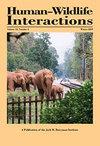A Profile of Wild Pig Hunters in Texas, USA
IF 0.9
4区 环境科学与生态学
Q4 BIODIVERSITY CONSERVATION
引用次数: 4
Abstract
Wild pigs (Sus scrofa) are a widespread exotic, invasive species that poses ecological, agricultural, and human health risks in invaded areas. Wildlife managers often manage wild pig abundance and expansion to mitigate these risks. The diversity of stakeholders involved in the issue of wild pig management complicates efforts to manage the species, and, to be successful, wildlife professionals should consider the human dimensions associated with wild pig management. The prevalence of privately owned lands in Texas, USA necessitates cooperation to enact effective management policies. In this study, we investigate the factors that affect a hunter’s likelihood to participate in wild pig hunting. Multiple factors affect participation in wild pig hunting activities. We found that participation in other types of big game hunting increased the likelihood of participation in wild pig hunting and that wild pig hunting does not deter individuals from participating in other types of hunting activities. Additionally, hunters’ attitudes toward wild pigs are important in determining the likelihood of participation in wild pig hunting. Finally, our results suggest that hunters are largely uninformed about wild pigs and do not hold the same perceptions, values, or tolerance levels of the species. The diversity of preferences among wild pig hunters necessitates that wildlife managers consider the desires of the public as well as natural resource needs in creating socially acceptable management plans for the species.美国德克萨斯州野猪猎人简介
野猪(Sus scrofa)是一种广泛存在的外来入侵物种,对入侵地区的生态、农业和人类健康构成威胁。野生动物管理者经常通过管理野猪的数量和数量来减轻这些风险。参与野猪管理问题的利益相关者的多样性使管理物种的努力复杂化,并且,为了取得成功,野生动物专业人员应该考虑与野猪管理相关的人类层面。美国德克萨斯州私有土地的普遍存在需要合作来制定有效的管理政策。在本研究中,我们调查了影响猎人参与野猪狩猎可能性的因素。多种因素影响着人们对野猪狩猎活动的参与。我们发现,参与其他类型的大型猎物狩猎增加了参与野猪狩猎的可能性,而野猪狩猎并不会阻止个人参与其他类型的狩猎活动。此外,猎人对野猪的态度在决定参与野猪狩猎的可能性方面也很重要。最后,我们的研究结果表明,猎人在很大程度上对野猪一无所知,他们对野猪的看法、价值观或容忍度都不一样。野猪猎人的偏好多样性要求野生动物管理者在为该物种制定社会可接受的管理计划时考虑公众的愿望以及自然资源的需求。
本文章由计算机程序翻译,如有差异,请以英文原文为准。
求助全文
约1分钟内获得全文
求助全文
来源期刊

Human–Wildlife Interactions
Environmental Science-Nature and Landscape Conservation
CiteScore
2.80
自引率
0.00%
发文量
0
审稿时长
11 weeks
期刊介绍:
Human–Wildlife Interactions (HWI) serves the professional needs of the wildlife biologist and manager in the arena of human–wildlife conflicts/interactions, wildlife damage management, and contemporary wildlife management. The intent of HWI is to publish original contributions on all aspects of contemporary wildlife management and human–wildlife interactions with an emphasis on scientific research and management case studies that identify and report innovative conservation strategies, technologies, tools, and partnerships that can enhance human–wildlife interactions by mitigating human–wildlife conflicts through direct and indirect management of wildlife and increased stakeholder engagement. Our intent is to promote a dialogue among wildlife professionals concerning contemporary management issues. As such, we hope to provide a repository for wildlife management science and case studies that document and share manager experiences and lessons learned.
 求助内容:
求助内容: 应助结果提醒方式:
应助结果提醒方式:


